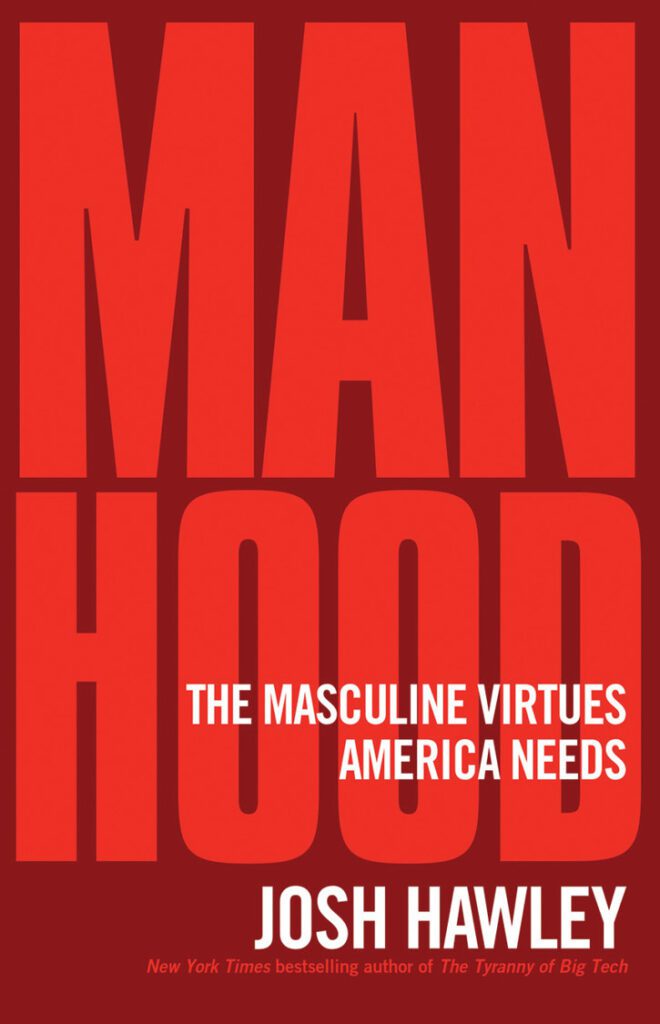
Twice the editors of LIBER asked the publisher of Manhood: The Masculine Virtues America Needs by Senator Josh Hawley (R-Missouri) for a review copy. Twice, they were met with silence. Undeterred, the editors went to Amazon.
I now have a copy of this screed, in which the author fashions himself as prophet, life coach, and imperfect spiritual striver in our broken world. The jacket photo shows a white man in front of a white screen, framed from brushed-back hair to crotch. Dressed in a dark T-shirt and jeans, he looks fit and trim. His arms are folded, his wedding ring visible. His smile is eager, even boyish. He has good teeth.
As much as I want to mock Manhood, I neither can nor should glibly ironize it away. For Hawley’s mixture of Evangelical Christianity, politics, and populism is too potent. Hawley himself is ambitious, powerful, intelligent. As I read Manhood, I thought that he must be intellectually more subtle than this campaign document. However, Hawley is proselytizing to a range of men who may initially prefer Reddit to Genesis. He wants to bring them the good news that God, the omnipotent Creator, has “. . . made man for good and . . . directed man—and woman—to rule.” This is no abstract master plan. He—God—has also woven a design for each individual “into the fabric of reality.”
Hawley’s life story, as Manhood tells it in autobiographical passages that personalize his message, provides a template for other men to ponder. Born in 1979, Joshua David Hawley is, coincidentally, a year younger than Ron DeSantis, a possible political rival. (Contemporary American male politicians insist on abbreviating their first names to one good-fella syllable: Josh for Joshua, Ron for Ronald, and to be fair, Joe for Joseph.)
Hawley’s father was a banker, his mother a teacher who read the Bible to her son when he was small. He casts his boyhood in rural Missouri in a golden light: the farm and family home of his maternal grandparents; the strong and abiding presence of that grandfather; the rituals of hunting and holidays; the inspiring male coaches at school; the good fortune of being a boy well-taught and well-brought up by God-loving and graceful men. He learns to respect the hard work of farmers, construction workers, and burger flippers. Crucially, at seventeen, after reading the theologian Martin Luther in the family home, he felt that he had a personal experience of God. He feels “with a force and clarity I had not known before, that God knew me, me personally. That across the expanse of the universe, he saw and recognized me. And he loved me, as a son.”
Like DeSantis, Hawley is a graduate of the elite educational institutions he now excoriates. As such, he can posture disingenuously as a man who knows these dangerous places but who has resisted their siren song of status and prestige. He attended a private prep school in Kansas City; Stanford University, where his professors thought him an exceptional student; and Yale Law. He then held a Supreme Court clerkship where he met his wife, now Erin Molloy Hawley, another Yale Law graduate. He felt “at home” with her. They have three children, two boys, one girl. Their family photographs on the internet are charming and appealing. He thanks her abundantly for help on this book, and indeed, its crisper pages have the same sharp lucidity as the op-eds of hers that I have read.
Hawley cuts the figure of a contemporary patriarch. His descriptions of Eve in the prelapsarian Garden of Eden, where she succumbed to the evil serpent, lack the traditional viciousness and bile. His wife is as well-educated as he is, and he speaks highly of her intelligence. He pursues a ruthless political career in which women will be his senatorial colleagues and equals. In marriage, he prescribes fidelity to one’s vows and the endurance a man needs to surmount familial difficulties, such as caring for an ill child alongside his wife. He loves, cares for, and prays for his children. He praises his baby daughter’s “spirit.” He rebukes misogyny, abusive behavior, male bluster and preening. He confesses to his failures and seeks forgiveness—as a Christian must.
Yet, women are both there and not-there. As I reread the Biblical passages that Hawley cites, the women are minimized or left out. In his prescriptions for child-raising, the struggles and courage of single mothers are ignored. In his autobiographical vignettes, his sister is rarely mentioned and then only as “my sister.” The question of race is more blatantly absent. Apparently, a man’s role as a servant of God overrides all other differences.

The Hawleys became law professors in Missouri. He did some private practice, devoting himself to First and Second Amendment issues, with a focus on religious liberty. Then, he entered politics. In 2019, after a mere two years as the Attorney General of Missouri, he defeated the wise and admirable Claire McCaskill for Senate. Hawley brags about his political independence, but he supported Donald Trump enthusiastically. In 2021, he was the first senator to back challenges in Congress to the results of the 2020 presidential election. On January 6, 2021, he notoriously saluted rioters before they broke into the Capitol building. Yet, no matter how diligently I sought for one, I could find no reference to Trump in Manhood. How sharper than a serpent’s tooth. . . .
The three great obsessions of Manhood logically interlock with each other. The first is the condition of the modern American man, the “male malaise,” seemingly far more parlous to the nation’s flourishing than difficult conditions for women. The second is the surprising cause of this malaise, “the Epicureans.” The last obsession is the remedy for this malaise: the banishment of Epicureanism.
Anxiety about men and masculinity is nothing new, especially when women seem to be strong. In Manhood at Harvard: William James and Others, Kim Townsend explores the concerns of three very different Harvard graduates from the nineteenth century: William James, W.E.B. DuBois, and Theodore Roosevelt. (That early twentieth-century American president is one of Hawley’s heroes, though presumably not for his environmentalism, a movement Hawley reviles.) Post-World War II America saw the emergence of two relevant bodies of thought, which at their best were historically acute and aware of the intersections of gender and other social forces. The first was feminism, diving into the wreck to survey the damage that history had done, especially to women. The second extended an older concern with the twitches and bad times of masculinity. At its deepest, as in the work of the psychiatrist James Gilligan on violence or the author Susan Faludi on working-class men, this study of masculinity accepted or incorporated feminist ideas. Other commentators could either be indifferent or hostile to them.
Hawley acknowledges only some of his predecessors and contemporaries in his worried depiction of American boys and men. They lag behind women educationally; suffer from the sour effects of a global economy; have painful suicide and addiction rates; delay forming stable families. Hawley is ferocious about “our epidemic” of fatherlessness. He also worries about the ubiquity of screens, leisure, and porn. I am no proponent of porn, but Hawley skitters through panic and into paranoia, when he writes about it. His villains, the Epicureans, are “happy for men to look at porn all day long . . . porn leads to men as androgynous consumers, beyond manhood, beyond sex even . . . easy to control and order about . . . ”.
Those “Epicureans,” Hawley’s second angry obsession, are the educated and affluent elites. Epicurus (who lived from 341 to 270 BCE) was a major Greek philosopher and scientist, whom Hawley blames for the stinking garbage of liberalism and the secular evils of our world. Who knew that he had such superpowers? Jean-Jacques Rousseau in the eighteenth century added to a toxic renunciation of the Bible and the biblical God, and to the denigration of the “traditional family, manhood, and even the reality of biological sex.” Trans people join with “androgynes” in their folly and rejection of the immutable truth that we are born men or women and mature accordingly.
Much of the substance of Hawley’s first obsession, male malaise, is distressing. His second obsession is mischaracterized. Epicurus did not want men to either curl up or seize a weapon in rage. Nor do I. If Hawley’s second obsession goes off the rails of history and common sense, his third, remedy, pulsates with the sincerity of his muscular Christianity. Get your act together, he tells men and boys. Develop some character. Do something. For we live with the tragedy of a postlapsarian world. God created Eden. Then Adam failed it, and let the chaos and darkness in. Since then, men of character have toiled to renew Eden and build a temple to God, but the United States has fallen prey to the Epicureans and their ilk.
Like Jordan Peterson, Hawley offers his remedy in the form of a to-do list. To renew themselves, their nation, and the world, men must take on six tasks. Each has a Biblical avatar: the husband, father, warrior (this from a man who did no military service), builder, priest, and king. To be a good king, like Solomon, a man must first have dominion over himself. He must be faithful, humble, and disciplined, but also courageous, risk-taking, generous, and unafraid of leadership. Since he is human, he will err, but he will admit to mistakes and improve. Then, he will find liberty, not in Epicurean self-indulgence, but in serving God and his purpose. The path to power and glory is submission to God’s plan.
Hawley ends his book with an anecdote about tucking Elijah, his older son, into bed. He takes Elijah’s “small hands” in his and prays that God will “awaken his heart to the call on his life, to the great adventure for which God made him.”
I read Manhood: The Masculine Virtues America Needs as a Supreme Court was issuing its diktats about LGBTQ rights, affirmative action, and student loan debt. I finished this review on the fourth of July, the commemoration of the “Declaration” of Americans’ inalienable rights to “life, liberty, and the pursuit of happiness.” My experiences of the past few days have intensified my belief in universal virtues that everyone can practice as well as my more specific belief in LGBTQ rights and educational opportunity. The genesis of such beliefs was, yes, in the Christian church of my youth. It was also in the elite college classroom where I read ancient Greek philosophers, among them that satanic Epicurus.

